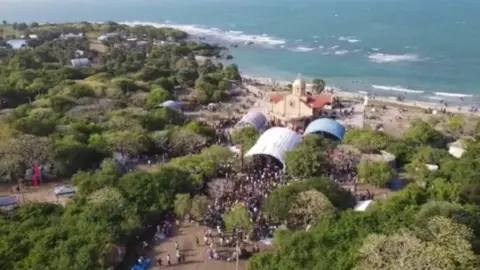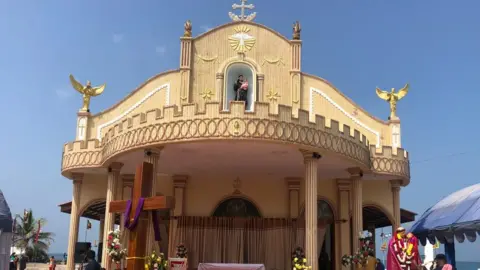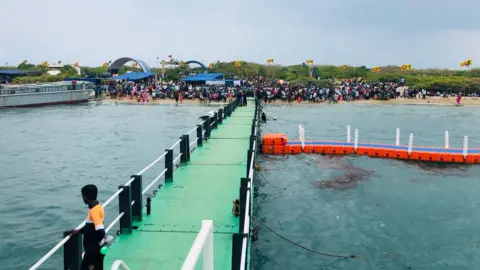Katchatheevu: Tiny Sri Lankan island sparks political row in India
 Prabhurao/BBC
Prabhurao/BBCA small, uninhabited island that is part of Sri Lanka has sparked a political row in India weeks before general elections kick off.
Katchatheevu - a strip of land spanning just about 1.9 sq km (0.7 sq miles) - is located in the Palk Strait, a stretch of ocean which divides India and Sri Lanka. It lies to the northeast to Rameswaram town in India's Tamil Nadu state and to the southwest of Sri Lanka's Jaffna city.
The island has no source of drinking water and the only structure on it is a church which holds an annual three-day festival that draws devotees from both India and Sri Lanka.
Since 1921, rulers in both India and Sri Lanka (then Ceylon) - British colonies at the time - had staked claim to fishing rights in the waters around Katchatheevu. But in 1974, India ended the dispute by relinquishing any claim over the island; two years later, India and Sri Lanka signed an agreement that prevented people from both countries from fishing in waters belonging to each other.
Now, that decades-old decision is in the headlines again after India's Prime Minister Narendra Modi accused the country's opposition Congress party - which was in power at the time - of "callously" giving away the island to Sri Lanka. The Congress has reacted sharply, accusing Mr Modi of raking up the issue ahead of elections due to "desperation".
The ostensible trigger for the controversy is new information accessed by a leader from Mr Modi's Bharatiya Janata Party (BJP) about the debates within the federal government about Katchatheevu in the 1960s.
But opposition leaders say the BJP is trying to turn Katchatheevu - a sensitive issue in Tamil Nadu - into a controversy to gain votes in the southern state, where it has been trying hard to make inroads. Tamil Nadu will vote in the first phase of the general election on 19 April.
 Prabhurao/BBC
Prabhurao/BBCThe controversy began on Sunday when Mr Modi shared an article from The Times of India newspaper on X (formerly Twitter), saying "Eye opening and startling! New facts reveal how Congress callously gave away Katchatheevu."
The article was based on documents obtained by K Annamalai, chief of the BJP in Tamil Nadu, under a law which allows Indians to access information from the government.
The documents quoted Jawaharlal Nehru, India's prime minister at the time, saying that he attached "no importance at all to [Katchatheevu]" and that he "would have no hesitation in giving up [India's] claims to it".
But according to the report, some officials from the ministry of external affairs and other experts said that India had a "good legal case" to assert claim over Katchatheevu as they claimed the island was ruled by an Indian king "continuously and uninterruptedly" between 1875 and 1948.
In 1974, when Nehru's daughter Indira Gandhi was prime minister, the Indian government ended the dispute with Sri Lanka over the island.
Since then, political parties in Tamil Nadu have regularly raised the issue of Katchatheevu and filed cases in court challenging the agreement with Sri Lanka - two of these cases are pending in the Supreme Court. Fishermen from Tamil Nadu have often been arrested by Sri Lankan authorities when entering the country's waters, including around Katchatheevu, so the issue often makes headlines there.
After Mr Modi's post, many BJP leaders and federal ministers joined him in criticising the Congress. They also said the Dravida Munnetra Kazhagam (DMK) - which currently governs Tamil Nadu and was also in power in 1974 - did not do enough to retain Katchatheevu. The DMK has denied this, saying they were not aware of the decision to relinquish claim over the island until the agreement was completed.
"The DMK had written several letters to the foreign ministry over the past many decades, upholding the rights of Tamil Nadu's fisher people over Katchatheevu. The BJP woke up to the issue only now, just as elections are nearing," DMK spokesperson Saravanan Annadurai told the BBC.
 Prabhurao/BBC
Prabhurao/BBCEven India's foreign minister, S Jaishankar held a press conference, saying that the issue had been "hidden too long from the gaze of the public".
However, when asked if India planned to revisit the 1974 agreement with Sri Lanka, Mr Jaishankar said the matter was in court.
In 2013, the federal government had told the Supreme Court that it could not "retrieve" Katchatheevu from Sri Lanka as "no territory belonging to India was ceded nor sovereignty relinquished since the area was in dispute and had never been demarcated".
And the next year, former attorney general Mukul Rohatgi, representing Mr Modi's government, told the court that if India wanted Katchatheevu, it would have to "go to war" to get it.
Mr Annamalai, however, has told reporters that the federal government was trying to "bring back" Katchatheevu to protect the interests of Tamil Nadu's fisher people.
The BBC has emailed the Sri Lankan high commission in India for comment and is awaiting a response.
A Sri Lankan minister told the Indian Express newspaper that the country has not received any "official communication" from India about control over Katchatheevu.
"As far as Sri Lanka is concerned, Katchatheevu island falls within the Sri Lankan line of control," said Jeevan Thondaman.

Read more India stories from the BBC:

